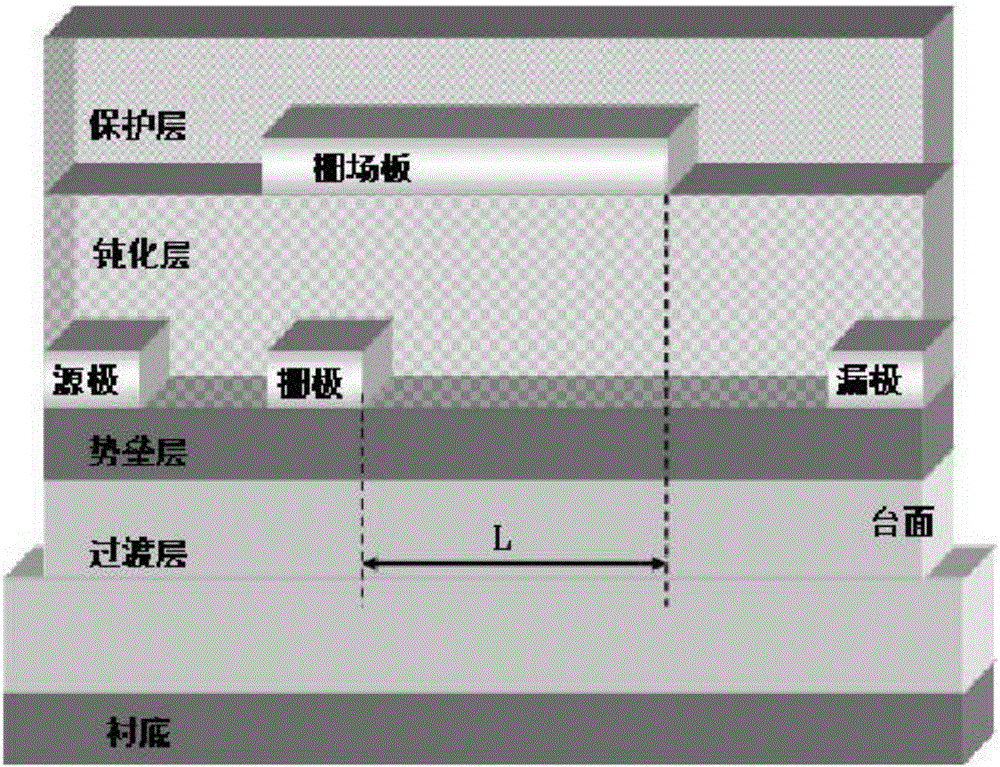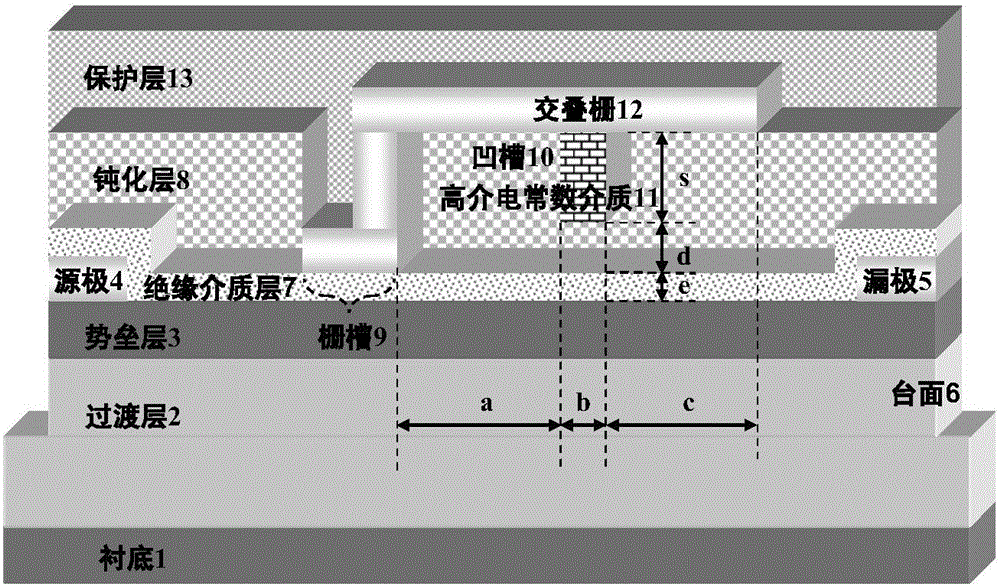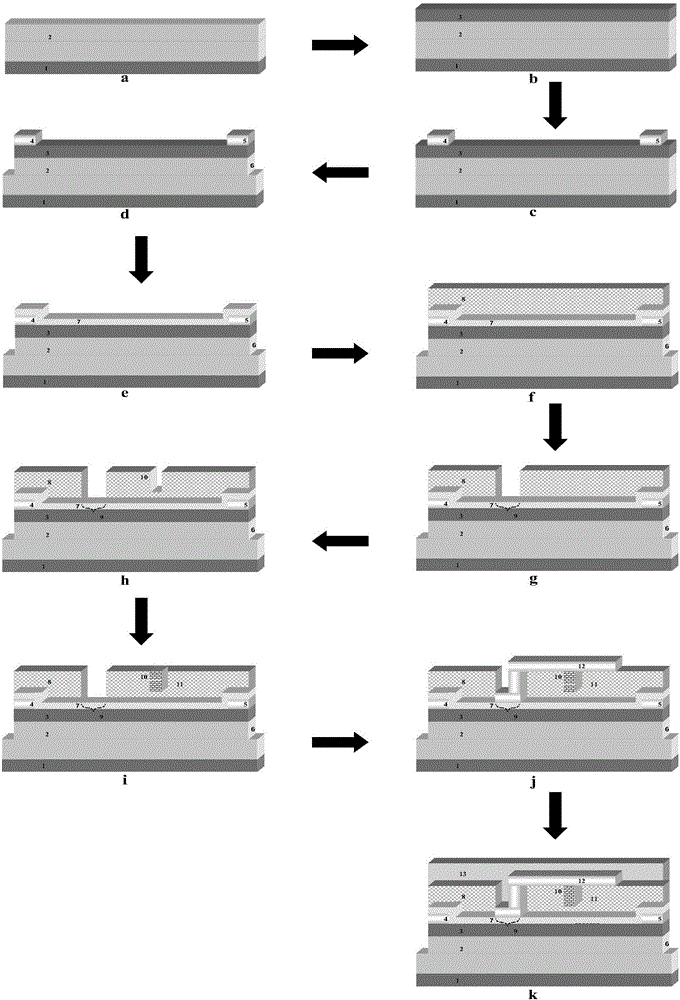Dielectric Modulation Composite Cross-Gate Power Device
A power device and overlapping gate technology, applied in the field of microelectronics, can solve the problems of complex structure and manufacturing process, reduce device yield, tedious process debugging, etc., and achieve the effects of improving distribution, improving reliability, and reducing electric field
- Summary
- Abstract
- Description
- Claims
- Application Information
AI Technical Summary
Problems solved by technology
Method used
Image
Examples
Embodiment 1
[0042] Embodiment 1: The production substrate is sapphire, and the insulating dielectric layer is SiO 2 , the passivation layer is Al 2 o 3 , the protective layer is SiN, and the high dielectric constant dielectric is HfO 2 , the cross gate is a dielectric modulation compound cross gate power device with Ti / Mo / Au metal combination.
[0043] Step 1. On the sapphire substrate 1, make the transition layer 2 by epitaxial GaN material from bottom to top, such as image 3 a.
[0044] An undoped transition layer 2 with a thickness of 1 μm is epitaxially formed on the sapphire substrate 1 by metal organic chemical vapor deposition technology, and the transition layer is composed of GaN materials with thicknesses of 30 nm and 0.97 μm from bottom to top. The process conditions used for the epitaxial lower layer GaN material are: temperature 530°C, pressure 45 Torr, hydrogen gas flow rate 4400 sccm, ammonia gas flow rate 4400 sccm, gallium source flow rate 22 μmol / min; the process co...
Embodiment 2
[0065] Embodiment 2: The substrate is made of silicon carbide, and the insulating dielectric layer is HfO 2 , the passivation layer is SiO 2 , the protective layer is SiN, and the high dielectric constant dielectric is Al 2 o 3 , the cross gate is a dielectric modulation compound cross gate power device with Ti / Ni / Au metal combination.
[0066] Step 1. Epitaxially AlN and GaN materials on the silicon carbide substrate 1 to form the transition layer 2, such as image 3 a.
[0067] 1.1) Using metal-organic chemical vapor deposition technology to epitaxially undoped AlN material with a thickness of 50nm on the silicon carbide substrate 1; the process conditions for the epitaxy are: temperature is 1000°C, pressure is 45Torr, hydrogen flow rate is 4600sccm, The flow rate of ammonia gas is 4600 sccm, and the flow rate of aluminum source is 5 μmol / min;
[0068] 1.2) Using metal-organic chemical vapor deposition technology to epitaxially GaN material with a thickness of 2.45 μm o...
Embodiment 3
[0102] Embodiment three: making substrate is silicon, insulating dielectric layer is Al 2 o 3 , the passivation layer is SiO 2 , the protective layer is SiN, and the high dielectric constant dielectric is HfO 2 , the cross gate is a dielectric modulation compound cross gate power device with Ti / Pt / Au metal combination.
[0103] Step A. Epitaxial AlN and GaN materials on the silicon substrate 1 from bottom to top to make the transition layer 2, such as image 3 a.
[0104] A1) Using metal-organic chemical vapor deposition technology at a temperature of 800° C., a pressure of 40 Torr, a flow rate of hydrogen gas of 4000 sccm, a flow rate of ammonia gas of 4000 sccm, and a flow rate of aluminum source of 25 μmol / min, the epitaxy on the silicon substrate 1 AlN material with a thickness of 200nm;
[0105] A2) Using metal-organic chemical vapor deposition technology at a temperature of 980°C, a pressure of 45 Torr, a flow rate of hydrogen gas of 4000 sccm, a flow rate of ammoni...
PUM
 Login to View More
Login to View More Abstract
Description
Claims
Application Information
 Login to View More
Login to View More - R&D
- Intellectual Property
- Life Sciences
- Materials
- Tech Scout
- Unparalleled Data Quality
- Higher Quality Content
- 60% Fewer Hallucinations
Browse by: Latest US Patents, China's latest patents, Technical Efficacy Thesaurus, Application Domain, Technology Topic, Popular Technical Reports.
© 2025 PatSnap. All rights reserved.Legal|Privacy policy|Modern Slavery Act Transparency Statement|Sitemap|About US| Contact US: help@patsnap.com



